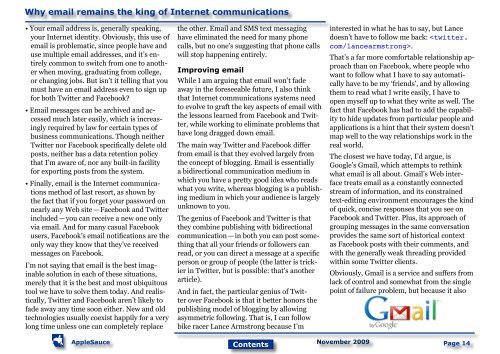AppleSauce, December 2009 - South Australian Apple Users' Club
AppleSauce, December 2009 - South Australian Apple Users' Club
AppleSauce, December 2009 - South Australian Apple Users' Club
Create successful ePaper yourself
Turn your PDF publications into a flip-book with our unique Google optimized e-Paper software.
Why email remains the king of Internet communications<br />
• Your email address is, generally speaking,<br />
your Internet identity. Obviously, this use of<br />
email is problematic, since people have and<br />
use multiple email addresses, and it’s entirely<br />
common to switch from one to another<br />
when moving, graduating from college,<br />
or changing jobs. But isn’t it telling that you<br />
must have an email address even to sign up<br />
for both Twitter and Facebook?<br />
• Email messages can be archived and accessed<br />
much later easily, which is increasingly<br />
required by law for certain types of<br />
business communications. Though neither<br />
Twitter nor Facebook specifically delete old<br />
posts, neither has a data retention policy<br />
that I’m aware of, nor any built-in facility<br />
for exporting posts from the system.<br />
• Finally, email is the Internet communications<br />
method of last resort, as shown by<br />
the fact that if you forget your password on<br />
nearly any Web site — Facebook and Twitter<br />
included — you can receive a new one only<br />
via email. And for many casual Facebook<br />
users, Facebook’s email notifications are the<br />
only way they know that they’ve received<br />
messages on Facebook.<br />
I’m not saying that email is the best imaginable<br />
solution in each of these situations,<br />
merely that it is the best and most ubiquitous<br />
tool we have to solve them today. And realistically,<br />
Twitter and Facebook aren’t likely to<br />
fade away any time soon either. New and old<br />
technologies usually coexist happily for a very<br />
long time unless one can completely replace<br />
the other. Email and SMS text messaging<br />
have eliminated the need for many phone<br />
calls, but no one’s suggesting that phone calls<br />
will stop happening entirely.<br />
Improving email<br />
While I am arguing that email won’t fade<br />
away in the foreseeable future, I also think<br />
that Internet communications systems need<br />
to evolve to graft the key aspects of email with<br />
the lessons learned from Facebook and Twitter,<br />
while working to eliminate problems that<br />
have long dragged down email.<br />
The main way Twitter and Facebook differ<br />
from email is that they evolved largely from<br />
the concept of blogging. Email is essentially<br />
a bidirectional communication medium in<br />
which you have a pretty good idea who reads<br />
what you write, whereas blogging is a publishing<br />
medium in which your audience is largely<br />
unknown to you.<br />
The genius of Facebook and Twitter is that<br />
they combine publishing with bidirectional<br />
communication — in both you can post something<br />
that all your friends or followers can<br />
read, or you can direct a message at a specific<br />
person or group of people (the latter is trickier<br />
in Twitter, but is possible: that’s another<br />
article).<br />
And in fact, the particular genius of Twitter<br />
over Facebook is that it better honors the<br />
publishing model of blogging by allowing<br />
asymmetric following. That is, I can follow<br />
bike racer Lance Armstrong because I’m<br />
interested in what he has to say, but Lance<br />
doesn’t have to follow me back: .<br />
That’s a far more comfortable relationship approach<br />
than on Facebook, where people who<br />
want to follow what I have to say automatically<br />
have to be my ‘friends’, and by allowing<br />
them to read what I write easily, I have to<br />
open myself up to what they write as well. The<br />
fact that Facebook has had to add the capability<br />
to hide updates from particular people and<br />
applications is a hint that their system doesn’t<br />
map well to the way relationships work in the<br />
real world.<br />
The closest we have today, I’d argue, is<br />
Google’s Gmail, which attempts to rethink<br />
what email is all about. Gmail’s Web interface<br />
treats email as a constantly connected<br />
stream of information, and its constrained<br />
text-editing environment encourages the kind<br />
of quick, concise responses that you see on<br />
Facebook and Twitter. Plus, its approach of<br />
grouping messages in the same conversation<br />
provides the same sort of historical context<br />
as Facebook posts with their comments, and<br />
with the generally weak threading provided<br />
within some Twitter clients.<br />
Obviously, Gmail is a service and suffers from<br />
lack of control and somewhat from the single<br />
point of failure problem, but because it also<br />
November <strong>2009</strong><br />
<strong><strong>Apple</strong>Sauce</strong> Page 14<br />
Contents






